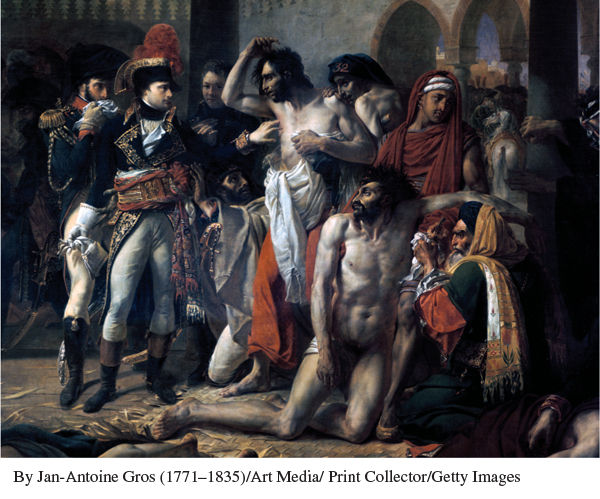A History of Western Society: Printed Page 635
A History of Western Society, Value Edition: Printed Page 607
A History of Western Society, Concise Edition: Printed Page 633
Napoleon’s Rule of France
Born in Corsica into an impoverished noble family in 1769, Napoleon left home and became a lieutenant in the French artillery in 1785. Converted to the revolutionary cause and rising rapidly in the republican army, Napoleon was placed in command of French forces in Italy and won brilliant victories there in 1796 and 1797. His next campaign, in Egypt, was a failure, but Napoleon returned to France before the fiasco was generally known, and his reputation remained intact. French aggression in Egypt and elsewhere provoked the British to organize a new alliance in 1798, the Second Coalition, that also included Austria and Russia.
Napoleon soon learned that some prominent members of the legislature were plotting against the Directory. The plotters’ dissatisfaction stemmed not so much from the Directory’s ruling dictatorially as from the fact that it was a weak dictatorship. Ten years of upheaval and uncertainty had made firm rule much more appealing than liberty and popular politics to these disillusioned revolutionaries. The abbé Sieyès personified this evolution in thinking. In 1789 he had written that the nobility was grossly overprivileged and that the entire people should rule the French nation. Now Sieyès’s motto was “Confidence from below, authority from above.”
The flamboyant thirty-

Napoleon’s domestic policy centered on using his popularity and charisma to maintain order and end civil strife. He did so by appeasing powerful groups in France by according them favors in return for loyal service. Napoleon’s bargain with the solid middle class was codified in the famous Civil Code of March 1804, also known as the Napoleonic Code, which reasserted two of the fundamental principles of the Revolution of 1789: equality of all male citizens before the law, and security of wealth and private property. Napoleon and the leading bankers of Paris established the privately owned Bank of France in 1800, which served the interests of both the state and the financial oligarchy. Napoleon won over peasants by defending the gains in land and status they had won during the Revolution.
The Napoleonic Era
| November 1799 | Napoleon overthrows the Directory |
| December 1799 | Napoleon’s new constitution approved |
| 1800 | Foundation of the Bank of France |
| 1801 | France defeats Austria and acquires Italian and German territories in the Treaty of Lunéville; Napoleon signs papal Concordat |
| 1802 | Treaty of Amiens |
| March 1804 | Napoleonic Code |
| December 1804 | Napoleon crowned emperor |
| October 1805 | Britain defeats the French fleet at the Battle of Trafalgar |
| December 1805 | Napoleon defeats Austria and Russia at the Battle of Austerlitz |
| 1807 | Napoleon redraws map of Europe in the treaties of Tilsit |
| 1808 | Spanish revolt against French occupation |
| 1810 | Height of the Grand Empire |
| June 1812 | Napoleon invades Russia |
| Fall–Winter 1812 | Napoleon makes a disastrous retreat from Russia |
| March 1814 | Russia, Prussia, Austria, and Britain sign the Treaty of Chaumont, pledging alliance to defeat Napoleon |
| April 1814 | Napoleon abdicates and is exiled to Elba; Louis XVIII restored to constitutional monarchy |
| February–June 1815 | Napoleon escapes from Elba but is defeated at the Battle of Waterloo; Louis XVIII restored to throne for second time |
At the same time, Napoleon consolidated his rule by recruiting disillusioned revolutionaries to form a network of ministers, prefects, and centrally appointed mayors. Nor were members of the old nobility slighted. In 1800 and again in 1802 Napoleon granted amnesty to one hundred thousand émigrés on the condition that they return to France and take a loyalty oath. Members of this returning elite soon ably occupied many high posts in the expanding centralized state. Napoleon also created a new imperial nobility in order to reward his most talented generals and officials.
Napoleon applied his diplomatic skills to healing the Catholic Church in France so that it could serve as a bulwark of social stability. After arduous negotiations, Napoleon and Pope Pius VII (pontificate 1800–1823) signed the Concordat (kuhn-
The domestic reforms of Napoleon’s early years were his greatest achievement. Much of his legal and administrative reorganization has survived in France to this day, but order and unity had a price: authoritarian rule. Women lost many of the gains they had made in the 1790s. Under the Napoleonic Code, women were dependents of either their fathers or their husbands, and they could not make contracts or have bank accounts in their own names. Napoleon and his advisers aimed at re-